- Home
- Charles de Lint
Newford Stories Page 2
Newford Stories Read online
Page 2
And then what?
You couldn’t live in the past. At some point you had to come up for air and then the present would be waiting for you, unchanged. The wasteland in her chest would still stretch on forever. She’d still be trying to understand what had happened. Had Peter changed? Had she changed? Had they both changed? And when did it happen? How much of their life together had been a lie?
It was enough to drive her mad.
It was enough to make her want to step into the otherness calling to her from out there in the storm and snow, step out and simply let it swallow her whole.
* * *
Jilly couldn’t put the girls from the café out of her mind either, but for a different reason. As soon as she’d gotten back to the studio, she’d taken her current work-in-progress down from the easel and replaced it with a fresh canvas. For a long moment she stared at the texture of the pale ground, a mix of gesso and a light burnt ochre acrylic wash, then she took up a stick of charcoal and began to sketch the faces of the two dark-haired girls before the memory of them left her mind.
She was working on their bodies, trying to capture the loose splay of their limbs and the curve of their backs as they’d slouched in toward each other over the café table, when there came a knock at her door.
“It’s open,” she called over her shoulder, too intent on what she was doing to look away.
“I could’ve been some mad, psychotic killer,” Geordie said as he came in.
He stamped his feet on the mat, brushed the snow from his shoulders and hat. Setting his fiddle case down by the door, he went over to the kitchen counter to see if Jilly had any coffee on.
“But instead,” Jilly said, “it’s only a mad, psychotic fiddler, so I’m entirely safe.”
“There’s no coffee.”
“Sure there is. It’s just waiting for you to make it.”
Geordie put on the kettle, then rummaged around in the fridge, trying to find which tin Jilly was keeping her coffee beans in this week. He found them in one that claimed to hold Scottish shortbreads.
“You want some?” he asked.
Jilly shook her head. “How’s Tanya?”
“Heading back to L.A. I just saw her off at the airport. The driving’s horrendous. There were cars in the ditch every couple hundred feet and I thought the bus would never make it back.”
“And yet, it did,” Jilly said.
Geordie smiled.
“And then,” she went on, “because you were feeling bored and lonely, you decided to come visit me at two o’clock in the morning.”
“Actually, I was out of coffee and I saw your light was on.” He crossed the loft and came around behind the easel so that he could see what she was working on. “Hey, you’re doing the crow girls.”
“You know them?”
Geordie nodded. “Maida and Zia. You’ve caught a good likeness of them—especially Zia. I love that crinkly smile of hers.”
“You can tell them apart?”
“You can’t?”
“I never saw them before tonight. Heather and I were in the Cyberbean and there they were, just asking to be drawn.” She added a bit of shading to the underside of a jaw, then turned to look at Geordie. “Why do you call them the crow girls?”
Geordie shrugged. “I don’t. Or at least I didn’t until I was talking to Jack Daw and that’s what he called them when they came sauntering by. The next time I saw them I was busking in front of St. Paul’s, so I started to play ‘The Blackbird,’ just to see what would happen, and sure enough, they came over to talk to me.”
“Crow girls,” Jilly repeated. The name certainly fit.
“They’re some kind of relation to Jack,” Geordie explained, “but I didn’t quite get it. Cousins, maybe.”
Jilly was suddenly struck with the memory of a long conversation she’d had with Jack one afternoon. She was working up sketches of the Crowsea Public Library for a commission when he came and sat beside her on the grass. With his long legs folded under him, black brimmed hat set at a jaunty angle, he’d regaled her with a long, rambling discourse on what he called the continent’s real First Nations.
“Animal people,” she said softly.
Geordie smiled. “I see he fed you that line, too.”
But Jilly wasn’t really listening—not to Geordie. She was remembering another part of that old conversation, something else Jack had told her.
“The thing we really don’t get,” he’d said, leaning back in the grass, “is these contracted families you have. The mother, the father, the children, all living alone in some big house. Our families extend as far as our bloodlines and friendship can reach.”
“I don’t know much about bloodlines,” Jilly said. “But I know about friends.”
He’d nodded. “That’s why I’m talking to you.”
Jilly blinked and looked at Geordie. “It made sense what he said.”
Geordie smiled. “Of course it did. Immortal animal people.”
“That, too. But I was talking about the weird way we think about families and children. Most people don’t even like kids—don’t want to see, hear, or hear about them. But when you look at other cultures, even close to home…up on the rez, in Chinatown, Little Italy…it’s these big rambling extended families, everybody taking care of everybody else.”
Geordie cleared his throat. Jilly waited for him to speak but he went instead to unplug the kettle and finish making the coffee. He ground up some beans and the noise of the hand-cranked machine seemed to reach out and fill every corner of the loft. When he stopped, the sudden silence was profound, as though the city outside were holding its breath along with the inheld breath of the room. Jilly was still watching him when he looked over at her.
“We don’t come from that kind of family,” he said finally.
“I know. That’s why we had to make our own.”
* * *
It’s late at night, snow whirling in dervishing gusts, and the crow girls are perched on top of the wooden fence that’s been erected around a work site on Williamson Street. Used to be a parking lot there, now it’s a big hole in the ground on its way to being one more office complex that nobody except the contractors wants. The top of the fence is barely an inch wide and slippery with snow, but they have no trouble balancing there.
Zia has a ring with a small spinning disc on it. Painted on the disc is a psychedelic coil that goes spiraling down into infinity. She keeps spinning it and the two of them stare down into the faraway place at the center of the spiral until the disc slows down, almost stops. Then Zia gives it another flick with her fingernail, and the coil goes spiraling down again.
“Where’d you get this anyway?” Maida asks.
Zia shrugs. “Can’t remember. Found it somewhere.”
“In someone’s pocket.”
“And you never did?”
Maida grins. “Just wish I’d seen it first, that’s all.”
They watch the disc some more, content.
“What do you think it’s like down there?” Zia says after a while. “On the other side of the spiral.”
Maida has to think about that for a moment. “Same as here,” she finally announces, then winks. “Only dizzier.”
They giggle, leaning into each other, tottering back and forth on their perch. Crow girls can’t be touched, can’t hardly be seen, except someone’s standing down there on the sidewalk, looking up through the falling snow, his worried expression so comical it sets them off on a new round of giggles.
“Careful now!” he calls up to them. He thinks they’re on drugs—they can tell. “You don’t want to—”
Before he can finish, they hold hands and let themselves fall backward , off the fence.
“Oh, Christ!”
He jumps, gets a handhold on the top of the fence and hauls himself up. But when he looks over, over and down, way down, there’s nothing to be seen. No girls lying at the bottom of that big hole in the ground, nothing at all. Only the falling snow. It
’s like they were never there.
His arms start to ache and he lowers himself back down the fence, lets go, bending his knees slightly to absorb the impact of the last couple of feet. He slips, catches his balance. It seems very still for a moment, so still he can hear an odd rhythmical whispering sound. Like wings. He looks up, but there’s too much snow coming down to see anything. A cab comes by, skidding on the slick street, and he blinks. The street’s full of city sounds again, muffled, but present. He hears the murmuring conversation of a couple approaching him, their shoulders and hair white with snow. A snowplow a few streets over. A distant siren.
He continues along his way, but he’s walking slowly now, trudging through the drifts, not thinking so much of two girls sitting on top of a fence as remembering how, when he was a boy, he used to dream that he could fly.
* * *
After fiddling a little more with her sketch, Jilly finally put her charcoal down. She made herself a cup of herbal tea with the leftover hot water in the kettle and joined Geordie where he was sitting on the sofa, watching the snow come down. It was warm in the loft, almost cozy compared to the storm on the other side of the windowpanes, or maybe because of the storm. Jilly leaned back on the sofa, enjoying the companionable silence for a while before she finally spoke.
“How do you feel after seeing the crow girls?” she asked.
Geordie turned to look at her. “What do you mean, how do I feel?”
“You know, good, bad…different…”
Geordie smiled. “Don’t you mean ‘indifferent’?”
“Maybe.” She picked up her tea from the crate where she’d set it and took a sip. “Well?” she asked when he didn’t continue.
“Okay. How do I feel? Good, I suppose. They’re fun, they make me smile. In fact, just thinking of them now makes me feel good.”
Jilly nodded thoughtfully as he spoke. “Me too. And something else as well.”
“The different,” Geordie began. He didn’t quite sigh. “You believe those stories of Jack’s, don’t you?”
“Of course. And you don’t?”
“I’m not sure,” he replied, surprising her.
“Well, I think these crow girls were in the Cyberbean for a purpose,” Jilly said. “Like in that rhyme about crows.”
Geordie got it right away. “Two for mirth.”
Jilly nodded. “Heather needed some serious cheering up. Maybe even something more. You know how when you start feeling low, you can get on this descending spiral of depression…everything goes wrong, things get worse because you expect them to?”
“Fight it with the power of positive thinking, I always say.”
“Easier said than done when you’re feeling that low. What you really need at a time like that is something completely unexpected to kick you out of it and remind you that there’s more to life than the hopeless, grey expanse you think is stretching in every direction. What Colin Wilson calls ‘absurd good news.’”
“You’ve been talking to my brother.”
“It doesn’t matter where I got it from—it’s still true.”
Geordie shook his head. “I don’t buy the idea that Maida and Zia showed up just to put your friend in a better mood. Even bird people can get a craving for a cup of coffee, can’t they?”
“Well, yes,” Jilly said. “But that doesn’t preclude their being there for Heather, as well. Sometimes when a person needs something badly enough, it just comes to them. A personal kind of steam engine time. You might not be able to articulate what it is you need, you might not even know you need something—at least, not at a conscious level—but the need’s still there, calling out to whatever’s willing to listen.”
Geordie smiled. “Like animal spirits.”
“Crow girls.”
Geordie shook his head. “Drink your tea and go to bed,” he told her. “I think you need a good night’s sleep.”
“But—”
“It was only a coincidence. Things don’t always have a meaning. Sometimes they just happen. And besides, how do you even know they had any effect on Heather?”
“I could just tell. And don’t change the subject.”
“I’m not.”
“Okay,” Jilly said. “But don’t you see? It doesn’t matter if it was a coincidence or not. They still showed up when Heather needed them. It’s more of that ‘small world, spooky world’ stuff Professor Dapple goes on about. Everything’s connected. It doesn’t matter if we can’t see how, it’s still all connected. You know, chaos theory and all that.”
Geordie shook his head, but he was smiling. “Does it ever strike you as weird when something Bramley’s talked up for years suddenly becomes an acceptable element of scientific study?”
“Nothing strikes me as truly weird,” Jilly told him. “There’s only stuff I haven’t figured out yet.”
* * *
Heather barely slept that night. For the longest time she simply couldn’t sleep, and then when she finally did, she was awake by dawn. Wide awake, but heavy with an exhaustion that came more from heartache than lack of sleep.
Sitting up against the headboard, she tried to resist the sudden tightness in her chest, but that sad, cold wasteland swelled inside her. The bed seemed depressingly huge. She didn’t so much miss Peter’s presence as feel adrift in the bed’s expanse of blankets and sheets. Adrift in her life. Why was it he seemed to have no trouble carrying on, when the simple act of getting up in the morning felt as though it would require far more energy than she could ever hope to muster?
She stared at the snow swirling against her window, not at all relishing the drive into town on a morning like this. If anything, it was coming down harder than it had been last night. All it took was the suggestion of snow and everybody in the city seemed to forget how to drive, never mind common courtesy or traffic laws. A blizzard like this would snarl traffic and back it up as far as the mountains.
She sighed, supposing it was just as well she’d woken so early since it would take her at least an extra hour to get downtown today.
Up, she told herself, and forced herself to swing her feet to the floor and rise. A shower helped. It didn’t really ease the heartache, but the hiss of the water made it easier to ignore her thoughts. Coffee, when she was dressed and had brewed a pot, helped more, though she still winced when Janice came bounding into the kitchen.
“It’s a snow day!” she cried. “No school. They just announced it on the radio. The school’s closed, closed, closed!”
She danced about in her flannel nightie, pirouetting in the small space between the counter and the table.
“Just yours,” Heather asked, “or Casey’s, too?”
“Mine, too,” Casey replied, following her sister into the room.
Unlike Janice, she was maintaining her cool, but Heather could tell she was just as excited. Too old to allow herself to take part in Janice’s spontaneous celebration, but young enough to be feeling giddy with the unexpected holiday.
“Good,” Heather said. “You can look after your sister.”
“Mom!” Janice protested. “I’m not a baby.”
“I know. It’s just good to have someone older in the house when—”
“You can’t be thinking of going in to work today,” Casey said.
“We could do all kinds of stuff,” Janice added. “Finish decorating the house. Baking.”
“Yeah,” Casey said, “all the things we don’t seem to have time for anymore.”
Heather sighed. “The trouble is,” she explained, “the real world doesn’t work like school. We don’t get snow days.”
Casey shook her head. “That is so unfair.”
The phone rang before Heather could agree.
“I’ll bet it’s your boss,” Janice said as Heather picked up the phone. “Calling to tell you it’s a snow day for you, too.”
Don’t I wish, Heather thought. But then what would she do at home all day? It was so hard being here, even with the girls and as much as she lov
ed them. Everywhere she turned, something reminded her of how the promises of a good life had turned into so much ash. At least work kept her from brooding. She brought the receiver up to her ear and spoke into the mouthpiece.
“Hello?”
“I’ve been thinking,” the voice on the other end of the line said. “About last night.”
Heather had to smile. Wasn’t that so Jilly, calling up first thing in the morning as though they were still in the middle of last night’s conversation.
“What about last night?” she said.
“Well, all sorts of stuff. Like remembering a perfect moment in the past and letting it carry you through a hard time now.”
If only, Heather thought. “I don’t have a moment that perfect,” she said.
“I sort of got that feeling,” Jilly told her. “That’s why I think they were a message—a kind of perfect moment now, that you can use the same way.”
“What are you talking about?”
“The crow girls. In the café last night.”
“The crow…” It took her a moment to realize what Jilly meant. Their complexions had been dark enough so she supposed they could have been Indians.
“How do you know what tribe they belonged to?”
“Not crow, Native American,” Jilly said, “but crow, bird people.”
Heather shook her head as she listened to what Jilly went on to say, for all that only her daughters were there to see the movement. Glum looks had replaced their earlier excitement when they realized the call wasn’t from her boss.
“Do you have any idea how improbable all of this sounds?” she asked when Jilly finished. “Life’s not like your paintings.”
“Says who?”
“How about common sense?”

 Widdershins
Widdershins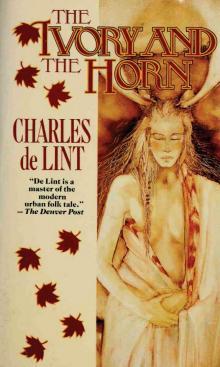 The Ivory and the Horn
The Ivory and the Horn Yarrow
Yarrow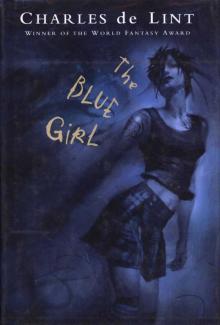 The Blue Girl
The Blue Girl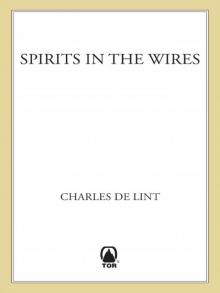 Spirits in the Wires
Spirits in the Wires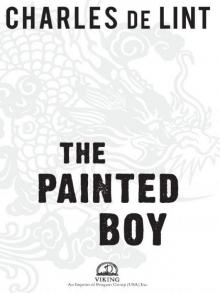 The Painted Boy
The Painted Boy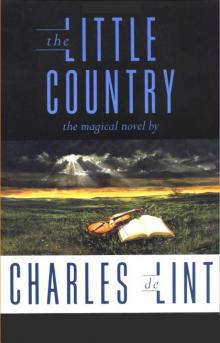 The Little Country
The Little Country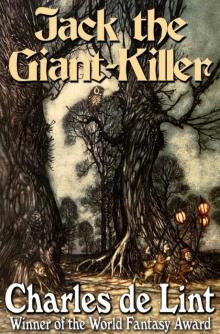 Jack of Kinrowan: Jack the Giant-Killer / Drink Down the Moon
Jack of Kinrowan: Jack the Giant-Killer / Drink Down the Moon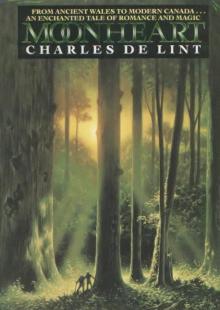 Moonheart
Moonheart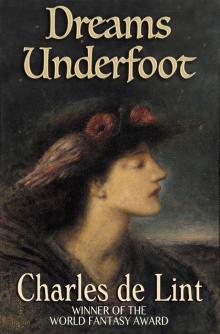 Dreams Underfoot
Dreams Underfoot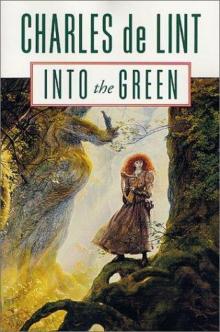 Into the Green
Into the Green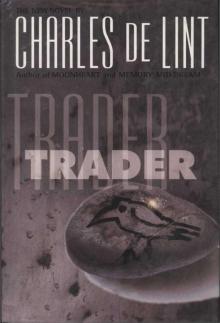 Trader
Trader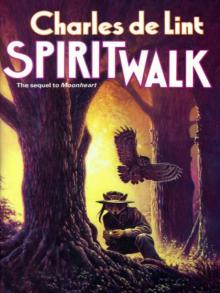 Spiritwalk
Spiritwalk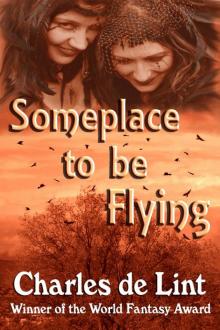 Someplace to Be Flying
Someplace to Be Flying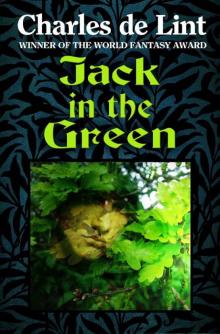 Jack in the Green
Jack in the Green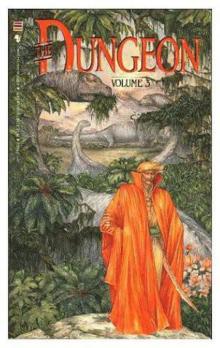 The Valley of Thunder
The Valley of Thunder Out of This World
Out of This World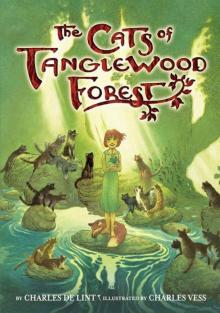 The Cats of Tanglewood Forest
The Cats of Tanglewood Forest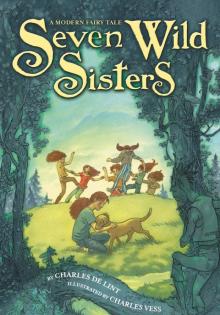 Seven Wild Sisters
Seven Wild Sisters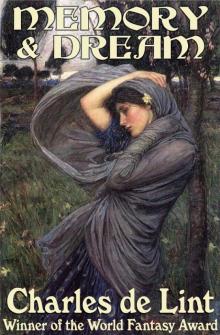 Memory and Dream
Memory and Dream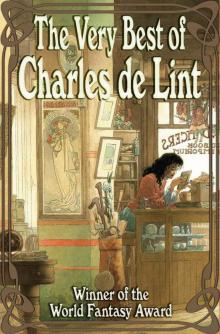 The Very Best of Charles De Lint
The Very Best of Charles De Lint Under My Skin
Under My Skin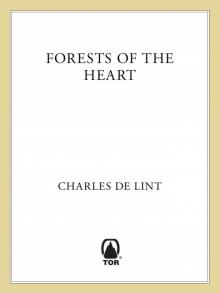 Forests of the Heart
Forests of the Heart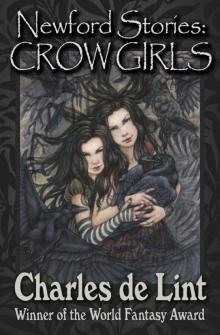 The Newford Stories
The Newford Stories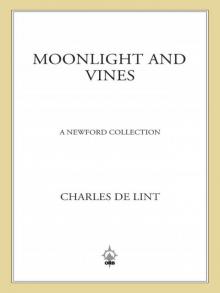 Moonlight and Vines
Moonlight and Vines Angel of Darkness
Angel of Darkness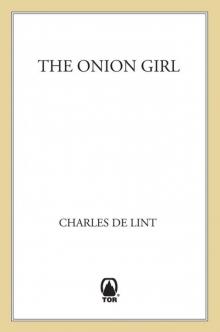 The Onion Girl
The Onion Girl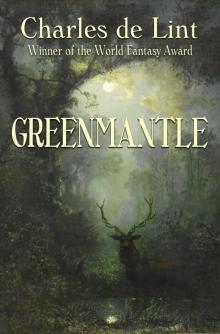 Greenmantle
Greenmantle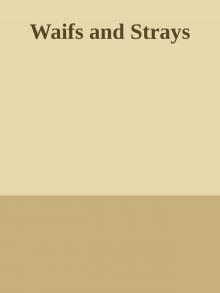 Waifs And Strays
Waifs And Strays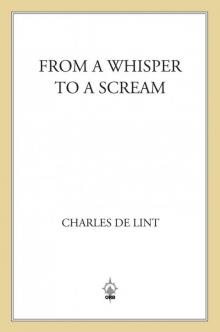 From a Whisper to a Scream
From a Whisper to a Scream Over My Head
Over My Head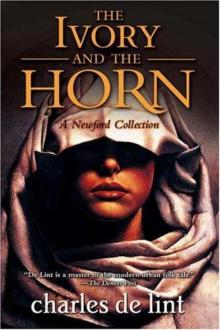 The Ivory and the Horn n-6
The Ivory and the Horn n-6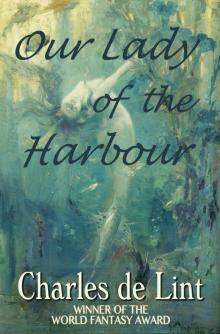 Our Lady of the Harbour
Our Lady of the Harbour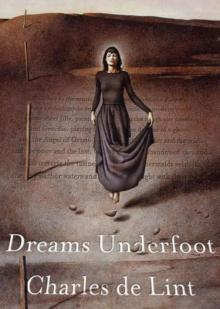 Dreams Underfoot n-1
Dreams Underfoot n-1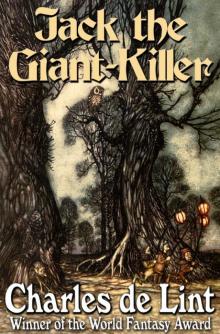 Jack the Giant-Killer (Jack of Kinrowan Book 1)
Jack the Giant-Killer (Jack of Kinrowan Book 1)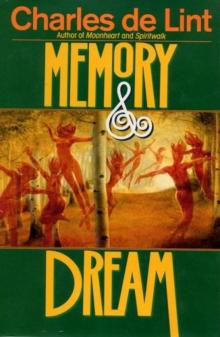 Memory and Dream n-5
Memory and Dream n-5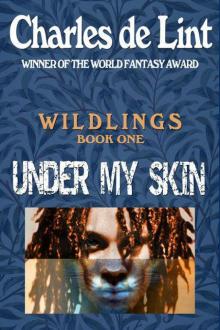 Under My Skin (Wildlings)
Under My Skin (Wildlings)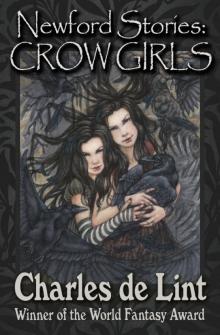 Newford Stories
Newford Stories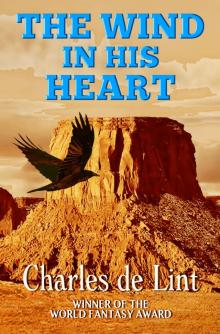 The Wind in His Heart
The Wind in His Heart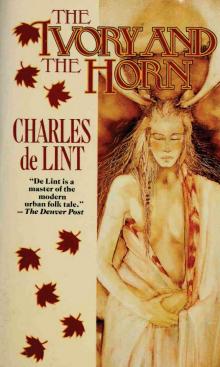 Ivory and the Horn
Ivory and the Horn